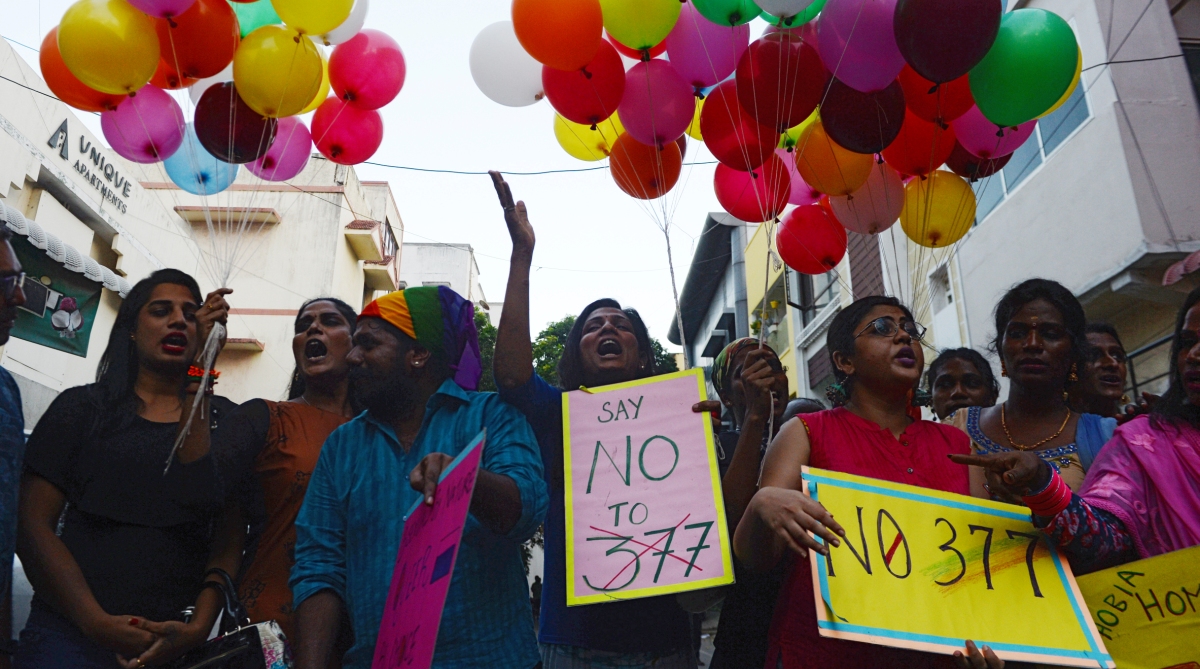SC asks states/UTs to decide on plea seeking to conduct yatras on poll awareness
The bench was told that such orders prohibit all kinds of assemblies, meetings and demonstrations during the duration of elections.
The Centre on Wednesday said it would not contest the provision as regards consensual gay sex between adults and left to the Supreme Court the decision on criminality of homosexuality.

Members of the LGBT community take part in a "Indian Coming out Day" celebration to mark the anniversary of Delhi High Court's verdict amending section 377 of Indian Penal Code (IPC), in Chennai on July 2, 2018. (Photo: AFP PHOTO / ARUN SANKAR)
The Centre on Wednesday said it would not contest the provision as regards consensual gay sex between adults and left to the Supreme Court the decision on criminality of homosexuality. The apex court is hearing a bunch of petitions challenging Section 377, which criminalises homosexuality, and it was the second day of hearing on Wednesday.
In an affidavit filed in the apex court, Additional Solicitor General Tushar Mehta requested that other matters such as incest, bestiality, etc, should be kept aloof from deliberation. The Centre said it would need more time to file an affidavit in case the apex court decided to widen the ambit of the petition and include other forms of sexual orientations other than the one concerning Section 377.
On the second day of the hearing on a clutch of petitions challenging criminalisation of consensual gay sex between two adults, the Centre said the Union of India leaves the “question of constitutional validity of Section 377 on ‘consensual acts of adults in private’” to the wisdom of the court.
Advertisement
A five-judge bench of the apex court began hearings today a day after it rejected the Centre’s plea seeking postponement of the proceedings. The petitions challenge Section 377 of the IPC, which criminalises sex between two consenting male or female adults calling it “unnatural”.
Section 377 refers to ‘unnatural offences’ and says whoever voluntarily has carnal intercourse against the order of nature with any man, woman or animal, shall be punished with imprisonment for life, or with imprisonment of either description for a term which may extend to 10 years, and shall also be liable to pay a fine.
Read More: What is Section 377? Everything you want to know
The new five-judge bench is headed by Chief Justice Dipak Misra, Justice RF Nariman, Justice AM Khanwilkar, Justice DY Chandrachud and Justice Indu Malhotra.
The apex court had in 2013 restored the criminality of the sexual relationship between persons of the same sex, after the Delhi High Court decriminalised it in 2009, following which several review petitions were filed. On dismissal of the pleas, curative petitions were filed by the affected parties for re-examination of the original verdict.
On 8 January, the top court said it would re-examine its verdict upholding Section 377, and observed that “a section of people or individuals who exercise their choice should never remain in a state of fear”. Its order came on a petition filed by Sangeet Natak Akademi awardee dancer Navtej Singh Johar, celebrity chef Ritu Dalmia and others.
The petitioners argue that Section 377 is “violative of fundamental rights under the Constitution’s Article 21 (right to life)”.
Advertisement